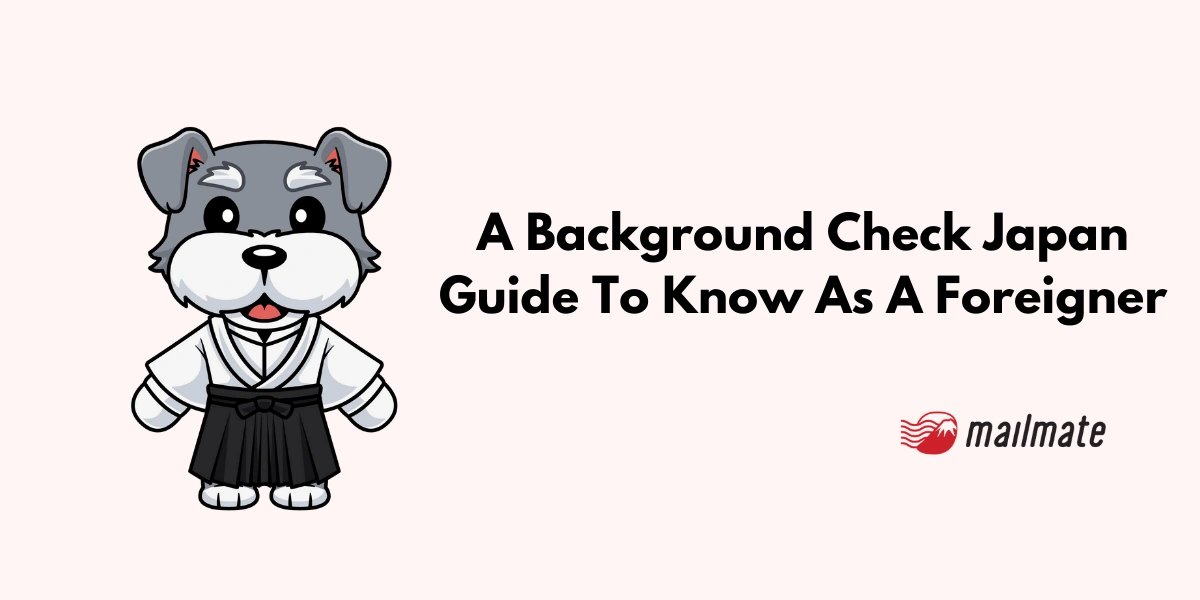A Background Check Japan Guide To Know As A Foreigner

A background check is essential as part of the hiring process, as well as vetting all potential hires based on their qualifications, experience, and reliability.
However, Japan is a little more strict on its background checks.
Thus, this background check Japan guide is here to explain things to you, especially if you are a foreigner in Japan.
What is a background check?
A background check allows someone to review and verify an individual's personal, professional, and sometimes financial history.
Many employers, landlords, and other organizations conduct these checks to assess a candidate's trustworthiness, qualifications, and overall suitability for a job.
Does Japan do background checks?
Like other countries, conducting background checks exists in Japan.
Japan conducts background checks, particularly for employment purposes. The extent and type of background check varies depending on the industry, job, and requirements.
A background check in Japan commonly focuses on verifying an applicant's employment history, education credentials, and references.
Criminal background checks are less commonly used and are typically for higher levels of trust or involve sensitive information.
Japan's privacy and data protection regulations
Background checks in Japan are legal when they comply with APPI and PPC to protect an individual's personal information.
Act on the Protection of Personal Information (APPI)
Japan's Personal Information Protection Act is the primary law regarding personal data. It sets rules for businesses and organizations to collect, use, store, and transfer personal information.
It was enacted in 2003 and significantly amended recently to protect individuals' privacy rights while balancing businesses' needs to process personal data.
Under APPI, businesses must have prior written consent from individuals to collect and use their personal information, ensure data accuracy, and take adequate security measures to protect the data from unauthorized access and breaches.
Personal Information Protection Commission (PPC)
The PPC regulates and enforces the APPI. Established in 2016, it oversees the implementation of Japan's privacy laws, provides guidelines for compliance, investigates violations, and has the authority to impose penalties for non-compliance.
PPC also ensures that international data transfers comply with Japan's data protection standards and collaborate with other countries' data protection.
Background check Japan screening
If you are going through a background check, it will likely be done by a third party. The APPI and PPC have very strict privacy laws regarding personal privacy.

Thus, you must give your consent for a Japan background check to be done on yourself by third-party agencies. In the consent, it will list the type of checks they will do, such as going through your past employment records or seeing any criminal and civil records you may have.
Personal verification
Most employee background checks begin with confirming the applicant's identity by verifying their full name, date of birth, residential address, nationality, marriage status, and family history.
It lays the groundwork for background checks in Japan, and more in-depth checks will be focused a little later.
Credentials
From educational qualifications to past employment history, these credits help your employees see what you are qualified to do.
Your potential employer may contact your previous workplace regarding employment. Due to APPI and PPC, your previous workplace may refrain from speaking on your performance but would rather confirm that you worked there and for how long.
Your past employment, reason for leaving, and achievements or issues will be noted to help any employer assess the applicant's professional track record and reliability.
Additionally, educational records or credentials such as academic degrees and qualifications are checked, especially for working visa purposes. In many cases, the same privacy laws will prevent Japanese universities from sharing specific information about you as a student. Still, background-checking companies can verify your educational history, such as your graduation.
Criminal records check

A criminal record checks whether the individual has any recorded criminal history. Most criminal and civil court records in Japan are available to the public.
If a criminal record check is required, the individual must obtain the record from the National Police Agency.
Personal references
Depending on the company, they may ask for personal references, which is only sometimes common in Japan.
This screening comes from many foreign companies in Japan; thus, asking for references is more common, especially in those in the tech industry.
Social media activities
Many corporations and businesses can also conduct social media checks on potential hires. They will review their Facebook, Twitter, Instagram, and LinkedIn accounts to gauge their character, work ethics, and integrity.
How to do a background check in Japan?
In Japan, background checks are done by specialized companies as part of an outsourcing process.
But first, it requires written consent from the individual and will explain exactly what information will be checked. This consent will include the individual's full name in English and Japanese and will include the type of screening and data for transparency.
The outsourced background check company handles the data securely and in compliance with APPI and PPC. Employers supervise it to follow strict guidelines.
Your employers can then only verify your education, past employment history, and public social media accounts. They can also store any relevant information securely and have clear policies on data retention and disposal.
Who does background checks in Japan?
There are times when a full background check must be done due to the industry or position you are applying for. It will include industries in:
Healthcare
Educational institutions
Finance sector
Government services
Legal firms
Additionally, any non-native candidates in Japan may require a background check.
Frequently Asked Questions (FAQs)
Are background checks legal in Japan?
All background checks in Japan are legal when they are conducted in compliance with the Act on the Protection of Personal Information (APPI) and the Personal Information Protection Commission (PPC).
In closing
Navigating a background check in Japan involves vetting and respective privacy laws for an individual. Whether a Japanese or a foreign company, background checks must comply with APPI and PPC regulations.
Spending too long figuring out your Japanese mail?
Virtual mail + translation services start at 3800 per month. 30-day money-back guarantee.

